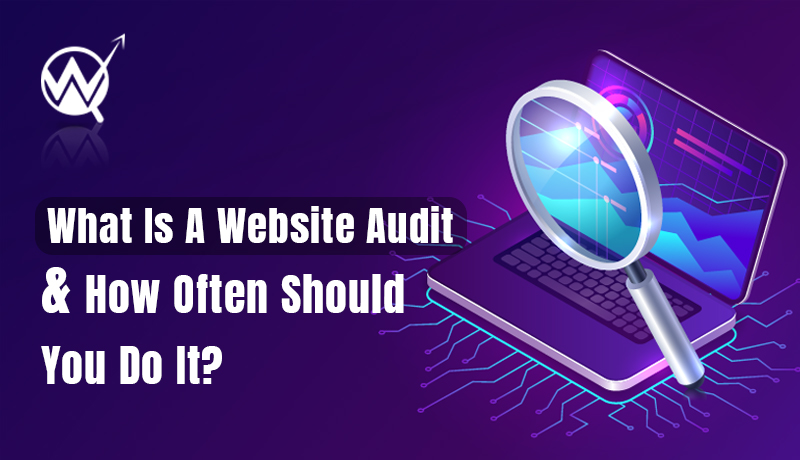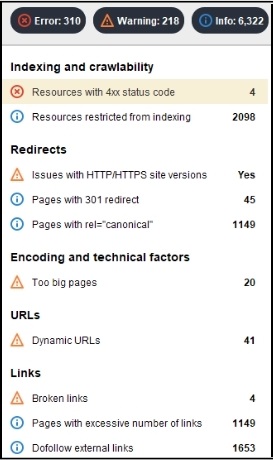
No matter how much time, effort, and money you put into a website, your sales numbers aren’t going to increase unless you provide a good browsing experience to the audience. Read on if you’re tired of pouring money into a website that isn’t converting.
Topic Outlines:
- What Is A Website Audit?
- What’s Included In A Website Audit?
- How Often Do You Need A Website Audit?
- How Much Does A Website Audit Cost?
- Free Website And SEO Audit Tools
What Is Website Auditing?
A website audit is a comprehensive analysis of a website’s overall performance. In simple terms, it analyses tactical and technical elements that could prevent the website from ranking well on Google.
Think of it as an audit for your business just as your company would be audited to meet statutory regulations and requirements in the industry, your website needs to be evaluated for Google’s website performance metrics.
This includes page speed, on-page SEO, meta title and description, bad, broken, missing or dead links, duplicate or thin content, keyword stuffing, etc. A proper website audit should tell you what’s working, what could be improved, and how to improve your rankings.
How strong is your website? Check your SEO health with this quick complimentary website audit

What’s Included In A Website Audit?
While a typical website audit analyses over 150+ elements, they can be broadly categorised into 7 different groups. Note: Some of these categories may overlap.
1. Site Health Audit
This audit analyses your website’s architecture and includes components such as page speed, internal links, URL structures, broken links, load time, site map, broken JavaScript and CSS files, etc.
Google Analytics and other analysis tools like SEMrush, Bing Webmaster, and Ahrefs Site Audit can help evaluate your website’s overall health and usability. Some are free, while others, like SEMrush and Ahrefs, are paid. Google Analytics should be a great place to start a comprehensive audit.
2. Security Audit
This audit includes security issues that could compromise sensitive information about your business or its visitors. We’ll help identify security vulnerabilities, loopholes, weaknesses, misconfigurations, and inadequate authentication mechanisms that could harm your website’s security or brand image.
While Google Analytics can highlight most security concerns, you can also use website security tools like SQLMap and Network Mapper for a comprehensive analysis.
Is your website vulnerable to malware and ransomware attacks? Call +91 8939 6909 23 to schedule a complimentary consultation.
3. Content Audit
Google and other search engines now use AI and Natural Language Processing to understand the intent and context behind a search query rather than only focusing on keywords. A content audit uses semantics SEO to check if the content is relevant, user-friendly, and rankable. We also check for plagiarised and thin content.
Tools like Plagiarism Detector and Grammarly can help detect plagiarised content.
4. Competitor Analysis
Understanding your competitors, both direct and SEO, is important to know why and how they’re ranking higher than you. Competitor analysis helps identify their strengths and weaknesses to improve your search rankings.
We use tools like Ahrefs, SEMrush, etc., to look for keyword gaps and determine your competitor’s on-page strategies, content organisation, backlink profiles, User experience, etc.
5. SEO Audit
An SEO audit analyses your website’s on-page and off-page search ranking performance. This includes keywords, irrelevant metadata issues, mobile optimisation, format errors in Robots.txt file and sitemap.xml files, incorrect sitemap, incorrect HTML page size, canonical issues, no redirects or too many redirects, AMP HTML issues, etc.
6. Crawlability Audit
A website’s structure should be clean and organised to allow search engine bots to index and rank your website. This includes checking if the URLs are indexable, error-free, load correctly, and are properly redirected. Sometimes, search engine robots are blocked from crawling your page. JavaScript-heavy pages could find it difficult to crawl your site. Sometimes, it could be something as simple as a no-index tag in the URL.
7. User Experience Audit
Ideally, a user should be able to find any page within three clicks. Similarly, they must have a similar experience on mobile and desktop. A UX audit ensures that users can find all the information they’re looking for easily and quickly. Need a UX team to spruce up your e-commerce site? Call +91 8939 6909 23.
How Often Do You Need A Website Audit?
How often your website should be audited depends on a range of factors, including your business niche, the size of your website, competition within your industry, etc.
Ideally, if you have a dedicated SEO team, they must run a brief check daily to ensure your backups are running smoothly or the website isn’t going offline without you knowing. The latter is especially important if you own an e-commerce website in a competitive industry; otherwise, you’d lose money with every downtime. There are several free and paid uptime monitoring tools to check if your website is available 24/7.
We suggest a website audit every six months if you have a small website or don’t need to add new content regularly. But, for larger websites or sites that update their content regularly, we recommend an SEO audit once every three months.
If you own an e-commerce website relying solely on web traffic, we recommend monthly website audits. This is because you’ll add new products, change prices, run promotional campaigns, etc. A website audit ensures these changes are being indexed or you aren’t making mistakes that could cost you dearly.
We recommend a bi-annual website audit for informational and showcase websites, as the content and design are likely to be static. So you don’t need to audit them as regularly as an e-commerce website.
Irrespective of the size and scale of your website, there are some situations where you must perform a website audit.
- If you observe a significant or sudden drop in organic traffic or conversion rate.
- If you have revamped your website or launched a new site.
- There has been a major Google update, and you want to ensure the site isn’t affected. If it was affected, an SEO audit will assess the issue and present solutions for site recovery.
- Not many know that changing hosting providers can affect SEO. An audit can reveal issues like incorrect canonical links or internal links, font size or colour changes, images not loading correctly, etc.
- New competitors in your industry or location can dramatically impact search engine rankings. A competitor audit can help you understand what they’re doing differently and use the insights to optimise your website.
How Much Does A Website Audit Cost?
Website audit costs vary depending on the website size and the type of audit you have chosen. Auditing a large-scale website with over 600+ pages will cost you thousands of dollars. With the best digital marketing company in Chennai, you can get an audit done much cheaper.
Besides website size, several other factors determine the cost of a website audit. For instance, if you’re looking for an all-inclusive analysis that covers every aspect, including technical SEO, competitor analysis, social content, link analysis, UX audit, and content audit, you’d be paying around ₹10K to ₹15K.
It also depends on the experience of the digital marketing company offering the service and the turnaround time promised by the agency. If you want a quicker audit, it will, naturally, cost you more.
Free SEO Audit Tools
There are an overwhelming number of free SEO audit tools in the market today, each serving a different purpose. For instance, the Google Search Console is a free tool to track CTRs, clicks, ranking positions, etc.
Google Analytics is another tool that measures overall performance by tracking data from Google and various channels, including third-party data.
If you’re interested in broad-based research for your keyword terms, we suggest using Google Trends. This tool measures keyword popularity, showing how its relevance changes over a span of time. Google Trends is important to analyse what kind of searches you can expect from a keyword.
If you’re unsure that a website’s structured data aligns with Google’s standards, run it through the Google Rich Results Testing Tool.
With Sitebulb’s free version, you can audit website structure, find duplicate content, optimise meta tags, and identify broken links for 500 URLs.
When using these tools, you must remember that each has its benefits and issues. Also, it is common for one tool to contradict another it is up to you to delve deep into why they’re presenting conflicting information and which data to rely on. At the end of the day, website audits aren’t merely a tool-based endeavour they rely more on the analytical skill of the webmaster.
Why Choose Wizi Digital For Website Audit?
As one of the best digital marketing companies in Chennai, we have audited hundreds of websites from across industries. We provide a FREE audit for clients choosing our services as a part of our services agreement. And if you don’t feel like committing yet, you can always choose our Free Website Audit, a brief yet critical analysis of your website.
We also routinely perform complimentary website audits as a part of our SEO care package for ongoing clients. This is especially helpful for clients in a competitive landscape like travel marketing as it helps them analyse and understand the success of their campaigns.
Our comprehensive audit includes 150+ checks, including technical SEO, competitor analysis, backlink analysis, keyword analysis, image optimisation, mobile SEO, UX audit, and more.
For comprehensive website audit services, call us at +91 8939 6909 23 to schedule a free consultation. Or fill in the contact form below: